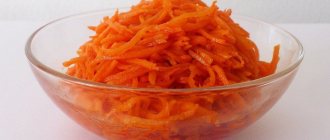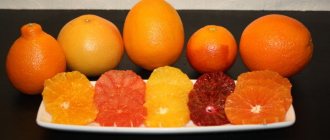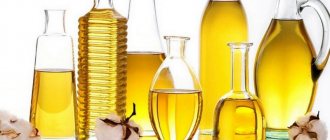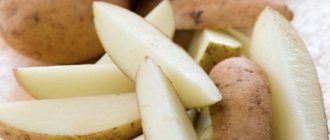Compound
The advantages of freshly squeezed juice are not only its sweet and sour taste and aroma, but also its high content of substances beneficial to the body. The pulp of the fruit contains a high concentration of vitamin C, which is a source of youth, beauty and health.
In addition, the composition is rich:
- vitamins A, E, H, K, PP;
- B vitamins;
- ascorbic acid;
- beta-carotene and alpha-carotene;
- macroelements: calcium, potassium, magnesium, sulfur, phosphorus, sodium;
- microelements: iron, selenium, zinc, copper, manganese, iodine;
- dietary fiber;
- amino acids.
A glass of natural orange juice contains approximately 90% carbohydrates, 6% protein and a minimal amount of fat.
Calorie content Fresh orange. Chemical composition and nutritional value.
Nutritional value and chemical composition of Fresh Orange.
| Nutrient | Quantity | Norm** | % of the norm in 100 g | % of the norm in 100 kcal | 100% normal |
| Calorie content | 43.15 kcal | 1684 kcal | 2.6% | 6% | 3903 g |
| Squirrels | 0.8 g | 76 g | 1.1% | 2.5% | 9500 g |
| Fats | 0.15 g | 56 g | 0.3% | 0.7% | 37333 g |
| Carbohydrates | 9.86 g | 219 g | 4.5% | 10.4% | 2221 g |
| Water | 44.15 g | 2273 g | 1.9% | 4.4% | 5148 g |
The energy value of Fresh Orange is 43.15 kcal.
Primary Source: Created in the application by the user. Read more.
** This table shows the average levels of vitamins and minerals for an adult. If you want to know the norms taking into account your gender, age and other factors, then use the “My Healthy Diet” application.
The nutritional value
Orange juice is low in calories because it is 85% water. Natural product prepared at home and store-bought juices have different nutritional values.
Freshly squeezed orange juice in an amount of 100 g contains approximately 40-45 kcal, and a glass of 250 ml contains approximately 100 kcal.
The amount of calories varies depending on the type of fruit and its ripeness. To get fresh juice, you need to have a juicer and fruit on hand. It is much faster and easier to buy a finished product in a store. It is worth understanding that juices from boxes are largely powdered products diluted with water.
To enhance the taste, a large amount of sugar is added to this drink, which significantly increases its calorie content. A glass of industrial orange drink contains about 150 kcal.
Orange juice (calorie content per 100 g, 250 ml is presented in the table below) is an invigorating drink:
| Compound | 100 g | 250 ml |
| Calories Protein Carbohydrates Fats | 40-45 kcal 1 g 8 g 0.1 g | 110-120 kcal 2-2.5 g 25 g 0.5 g |
Chemical composition, vitamins and microelements in orange juice
100 ml of raw orange juice, prepared at home, has the following composition:
- Dietary fiber - 0.2 g
- Water - 88.3 g
- Ash - 0.4 g
Vitamins:
- Vitamin A - 10 mcg;
- Vitamin B1 - 0.09 mg;
- Vitamin B2 - 0.03 mg;
- Vitamin B3 - 6.2 mg;
- Vitamin B5 - 0.19 mg;
- Vitamin B6 - 0.04 mg;
- Vitamin B9 - 30 mcg;
- Vitamin C - 50 mg;
- Vitamin E - 0.04 mg;
- Vitamin K - 0.1 mcg;
- Vitamin PP - 0.4 mg.
Macronutrients:
- Potassium - 200 mg;
- Calcium - 11 mg;
- Magnesium - 11 mg;
- Sodium - 1 mg;
- Sulfur - 7 mg;
- Phosphorus - 17 mg.
Microelements
- Iron - 0.2 mg;
- Manganese - 0.014 mg;
- Copper - 44 mcg;
- Selenium - 0.1 mcg;
- Zinc - 0.05 mg.
Digestible carbohydrates - mono- and disaccharides (sugars) - 8.4 g.
Essential and essential amino acids - 0.3 g.
Mono and - polyunsaturated fatty acids - 0.07 g.
Calorie content, dietary fat and glycemic index
Fresh orange has a negative calorie content of 40 kcal and a low glycemic index of 40-45 units.
BJU content per 100 ml of orange juice:
- proteins 0.7 g;
- fats 0.2 g;
- carbohydrates 10.2 g.
Presence of harmful additives in juice
There is some pretty good news: none of the orange juices tested contained harmful sweeteners, colorings, or preservatives. Yes, oddly enough, sweeteners that replace sugar can be very harmful. Such as aspartame, acesulfame potassium, saccharinate and sodium cyclamate are tens and even hundreds of times sweeter than sugar: the presence of these additives in food is completely undesirable. In addition, the juices were tested for 5-hydroxymethylfurfural content. This is a carcinogen hazardous to health, which can be formed when foods are heated (much depends on the frequency and intensity of heating). Experience has shown that the technology for the production of orange juices was not violated in this regard: this substance is not present in any sample.
Beneficial properties of freshly squeezed drink
Orange pulp is a valuable source of vitamins and is very beneficial for health. You can get even more nutrients by consuming freshly squeezed fruit juice, but it is important to understand that only natural fresh juice without added preservatives is beneficial to the body.
There are a large number of juices on sale from various companies, but a product that is stored for a long time cannot be natural. Only freshly squeezed juice without dyes, flavor enhancers and other harmful additives can truly benefit the body.
When consumed regularly, natural orange juice can have the following effects on the human body:
- increase immunity;
- cleanse of impurities and toxins;
- prevent the development of cancerous tumors;
- improve vision;
- reduce blood pressure;
- lower cholesterol levels;
- increase blood circulation;
- promote weight loss;
- normalize the functioning of the nervous system.
Due to the high content of vitamin C in the product, the juice has a rejuvenating effect on the female body. It can be used both internally and externally. Regular washing with juice diluted with water helps get rid of freckles and age spots, the drink makes the skin fresh. For men, orange juice helps increase potency and increase male strength.
Orange juice "I"
Price per liter - 106 rubles. The inscription on the box immediately catches your eye: “The product is intended for feeding children of preschool and school age from 3 years old.” I would like to look into the eyes of the brilliant person who composed this, but even more so - the one who approved the layout of the box design. Perhaps I understood something wrong, but if you are releasing a product for the mass user, please write it in such a way that even a fool can understand it.
The drink poured into a glass has an almost smooth surface.
Let's taste the juice
1st approach:
If this was freshly squeezed juice, I would not hesitate to say that some of the fruits used were moldy. Since the technology for producing reconstituted juice excludes the development of mold in the concentrate, I don’t even know what to think. I can only say that the bitter and putrid aftertaste was an unpleasant surprise for me. Still, expensive juice should not leave such a feeling. There is a suspension of pulp, but it is insignificant.
2nd approach:
I confirm the presence of a putrid taste (maybe the batch was unsuccessful?), the taste is insignificant, but is clearly felt.
3rd approach:
the taste of spoiled oranges, to be honest, I didn’t expect this from Yashka.
Verdict : not tasty, I won’t buy it.
When not to drink orange juice
It may sound strange, but drinking orange juice every day can have a negative impact on your health. Let's start with the fact that the greatest harm of orange juice is aimed at diabetics.
This is because this juice contains quite a lot of glucose, which is essentially sugar, and therefore this product is not suitable for regular consumption by people who have diabetes.
Do not forget that orange juice contains various acids, which not only can cause heartburn, but also harm your teeth if you drink the juice without a straw very often.
Separately, there are all sorts of congenital intolerances to a given product, which in themselves eliminate it from the human diet.
Chemical composition
Orange juice contains a lot of Vitamin C. The human body really needs it to participate in redox reactions. This vitamin helps iron be better absorbed and helps the immune system function as a whole.
Fresh juice also contains Vitamin A, which is necessary for the metabolic process. The vitamin also protects vision.
The product contains B vitamins. They are the most important elements for the proper functioning of the body. This vitamin is especially necessary for women during pregnancy.
Freshly squeezed orange juice also contains:
- Iodine, Magnesium,
- Cobalt, Calcium,
- Phosphorus, Sodium,
- Iron, Fluorine, Zinc.
The drink contains amino acids and pectin. If we talk about the action of these elements together, they prolong youth and help lose weight.
The benefits and harms of orange juice
Orange juice is considered the most popular drink; fresh apple juice is more popular. There are no people indifferent to this drink, but many cannot drink it due to their health. The benefit of this juice lies in its composition. Orange contains many useful elements, such as:
- vitamins;
- minerals;
- antioxidants;
- cellulose;
- flavonoids;
- essential oils;
- organic acids.
Due to its composition, the juice is harmless to the figure and good for the immune system. Despite its high beneficial properties, orange juice can also be harmful to health. A person suffering from an allergic reaction should not drink orange juice as it may cause a reaction or swelling. If you have any doubts or chronic diseases, you should consult your doctor whether you can drink orange juice or not.
In addition, it is worth mentioning preservatives and sugar, which are found in large quantities in canned orange juice. These elements can harm a person with diabetes or heart disease, so you should be careful when choosing juice.
Harm and contraindications
Despite the enormous benefits, the product has contraindications for use:
1. You should not drink this drink if you have an individual intolerance.
2. You should not drink fresh juice on an empty stomach. The product increases the acidity of gastric juice.
3. It is worth refusing freshly squeezed juice in case of hepatitis, surgical gastritis, pancreatitis, urolithiasis, intestinal or stomach ulcers, colitis, cholecystitis, cholelithiasis.
4. In some cases, this product provokes the appearance of type 2 diabetes. Therefore, you should not abuse this drink.
5. Tooth enamel suffers from fresh juice. To keep your teeth strong and healthy, after drinking the juice you need to rinse your mouth with water or even brush your mouth with toothpaste.
6. When breastfeeding, women introduce the drink into their diet with caution and gradually. This will protect mother and baby from unwanted consequences.
“Juice” – in more detail:
- ►Apple juice
- Green apple juice
- Concentrated apple juice
- Apple juice without sugar
Grape juiceBlended juiceLemon juice►Pineapple juice
- Orange-pineapple juice
Pineapple-grapefruit juicePineapple juice concentrate►Grapefruit juice
- Orange-grapefruit juice
Pineapple-grapefruit juiceFreshly squeezed grapefruit juiceGrapefruit juice concentrateAcerola juiceBlackberry juiceCranberry juiceLime juicePassion fruit juicePomegranate juicePlum juiceTangerine juiceFruit juice►Orange juice
- Freshly squeezed orange juice
Orange juice without sugarConcentrated orange juiceOrange-pineapple juiceOrange-grapefruit juiceWatermelon juiceGuava juice
“Juice” – in more detail:
- ►Apple juice
- Green apple juice
- Concentrated apple juice
- Apple juice without sugar
Grape juiceBlended juiceLemon juice►Pineapple juice
- Orange-pineapple juice
Pineapple-grapefruit juicePineapple juice concentrate►Grapefruit juice
- Orange-grapefruit juice
Pineapple-grapefruit juiceFreshly squeezed grapefruit juiceGrapefruit juice concentrateAcerola juiceBlackberry juiceCranberry juiceLime juicePassion fruit juicePomegranate juicePlum juiceTangerine juiceFruit juice►Orange juice
- Freshly squeezed orange juice
Orange juice without sugarConcentrated orange juiceOrange-pineapple juiceOrange-grapefruit juiceWatermelon juiceGuava juice
Negative Impact
Here is such a miraculous freshly squeezed orange juice, the calorie content of which allows you to drink it with peace of mind, a glass a day, without fear of gaining extra pounds.
But along with these beneficial properties, drinking too much of the drink can cause allergic reactions or stomach upset.
In general, this drink is not recommended for everyone. This juice is contraindicated for people who suffer from high stomach acidity or diabetes.
You should also not drink orange juice if you have an exacerbation of stomach diseases or allergies to citrus fruits.
How to select and store
Industrially produced orange juices are much inferior to natural drinks obtained at home, since they do not contain as many vitamins and nutrients.
Depending on the original product, proportions, production process and various additives, the composition of a drink purchased in a store may contain different percentages of natural juice.
It is best to purchase nectar, as it contains 20-50% natural juice, and fruit juice about 15-20%.
The orange juice drink is only 10% natural, and the powder concentrate is completely an artificial mixture.
When purchasing, you should always pay attention to the shelf life of the product indicated on the packaging. The longer the period of use, the less natural the drink. Opened packaging should be stored in the refrigerator for no more than 3 days.
It is advisable to consume freshly squeezed orange juice orally within the first 2-3 hours after squeezing. When interacting with air, it gradually begins to lose its beneficial qualities, so ideally it should be drunk immediately after preparation. If, however, the product is made for future use, then it should be stored in a tightly closed container in the refrigerator.
A small pinch of citric acid or a few drops of lemon, which are added to the finished juice, will help protect the drink from souring.
Homemade frozen orange juice
Orange juice is a good thirst quencher. It will never be out of place on the holiday table. A drink made from frozen fruits is especially relevant in the hot summer. You can easily prepare it yourself.
Oranges (2 pieces) are washed and placed in the freezer overnight. After the freezing process, they are cut and ground in a meat grinder, poured with one and a half liters of cold boiled water.
You can also use bottled water. Let it brew for ten minutes, filter through a sieve. Add sugar and citric acid. Add three liters of water.
Pour into bottles and place in the refrigerator. It turns out from one orange two liters of natural, tasty, cheap juice! And from the pulp that remains, you can also make jam.
How to choose a truly healthy citrus?
On store shelves and market stalls you can find oranges of different sizes and shapes.
To choose a ripe and sweet fruit, it is recommended to pay attention to a number of nuances:
- high-quality citrus smells strong and pleasant;
- the crust should be smooth, clearly orange in color, without dents, spots or bumps;
- the juicy fruit feels heavy for its size;
- fresh fruits do not collapse when pressed.
There is often a correlation between the taste and size of an orange - medium and small ones are considered sweeter.
In addition, there is a red variety on sale - it has a strong aroma and a high content of nutrients.











